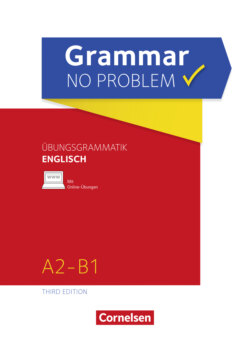Читать книгу Grammar no problem - Third Edition / A2/B1 - Übungsgrammatik Englisch mit beiliegendem Lösungsschlüssel - John Stevens - Страница 8
На сайте Литреса книга снята с продажи.
Оглавление3 Simple present – Present progressive (1)
Einfache Gegenwart – Verlaufsform der Gegenwart (1)
Einfache Gegenwart: Dauerzustand
■ Mit der einfachen Gegenwart beschreibt man
1. regelmäßige und sich wiederholende Vorgänge, die zusammen eine bestimmte Situation bilden
2. Dauerzustände.
Feststehende Tatsachen:
I come from Germany.
Gewohnheiten:
I don’t eat much chocolate.
Regelmäßige Vorgänge:
The cinema shows a lot of foreign films.
Bräuche:
People don’t celebrate Christmas in Japan.
Berufsangaben:
She’s a writer. She writes detective stories.
Angaben zu Hobbys und Freizeitaktivitäten:
Don plays a lot of tennis.
Verlaufsform: Momentanes Geschehen
■ Mit der Verlaufsform beschreibt man
1. einen augenblicklichen Einzelvorgang, der im Verlauf begriffen und nicht abgeschlossen ist
2. eine vorübergehende Situation.
Augenblickliche Vorgänge:
Hello, Ann. I’m phoning from London.
What are you doing on the floor?
He isn’t reading. Look, his eyes are shut.
We’re waiting for Don. He has the key.
Vorübergehende Situationen:
Our neighbours are on holiday this week, so we’re looking after their cat.
The weather is so nice that I’m cycling to work this week.
Phil is playing a lot of tennis at the moment because he’s trying to get fit again.
Einfache Form und Verlaufsform im Vergleich
| Ann works for Siemens in Munich. | → | She is working on a new project now. |
| I don’t usually enjoy parties. | → | But I’m enjoying this one. |
| It doesn’t snow here much. | → | But it’s snowing now. |
| At Tim’s school they learn two foreign languages. | → | Tim is learning French and Spanish. |
| I usually get up at six. | → | This week I’m getting up late. I’m on holiday. |
Eine feste berufliche Situation wird immer mit der einfachen Gegenwart ausgedrückt; eine vorübergehende oder nicht abgeschlossene Lern- oder Ausbildungssituation mit der Verlaufsform.
| Don works for VW. He designs cars. | → | Don’s daughter is a student. She is studying design. She is training to be a designer. |
Das Wichtigste in Kürze
■ Einfache Gegenwart: Etwas geschieht in bestimmten Abständen = Dauersituation/Dauerzustand
■ Verlaufsform: Etwas ist jetzt gerade im Verlauf begriffen, nicht abgeschlossen, vorübergehend
One sentence has a mistake. Which sentence is correct?
| a | I’m coming from England. I was born in Bristol. | |
| b | I come from England. I was born in Bristol. | |
| 1 | a | This company makes computer chips. |
| b | This company is making computer chips. | |
| 2 | a | We are saving to buy a new car. |
| b | We save to buy a new car. | |
| 3 | a | My sister learns English for her job. |
| b | My sister is learning English for her job. | |
| 4 | a | I often watch English films. |
| b | I’m often watching English films. | |
| 5 | a | Their children never help at home. |
| b | Their children are never helping at home. | |
| 6 | a | Helen is travelling a lot at the moment. b Helen travels a lot at the moment. |
What usually happens and what is happening today, this week …?
(usually) I / finish work at 5 o’clock
(this week) I / finish at 4 o’clock
I usually finish work at 5 o’clock. This week I’m finishing at 4 o’clock.
1 (usually) we / go to the supermarket on Fridays (this week) we / go on Saturday
2 (always) John / go to work by car (today) he / walk because his car’s at the garage
3 (often) the kids / visit their dad at the weekend (this weekend) they / stay at home
4 (this year) Jane / go to Australia for Christmas (sometimes) she / spend Christmas abroad
5 (this week) I / not work on Friday (never) I / work on Mondays, so that means I can have a long weekend
Complete these dialogues. Put the verbs in the simple present or the present progessive.
| 1 | A: | Would you like to come to the cinema this evening? |
| B: | I’m sorry, I can’t. My sister …………………………….. (stay) with us at the moment. | |
| A: | How long …………………………….. (she/stay)? | |
| 2 | A: | Hello, Petra! Where …………………………….. (you/go)? |
| B: | I…………………………….. (go) to my evening class. I …………………………….. (learn) Italian. | |
| A: | Really? I …………………………….. (go) to an Italian class once a week too. | |
| 3 | A: | …………………………….. (you/normally go) on holiday in the summer? |
| B: | Yes, we …………………………….. (usually spend) a month in the south of France, but this year we …………………………….. (stay) here. | |
| A: | Yes, this year we …………………………….. (not go) on holiday either. | |
| 4 | A: | Where …………………………….. (your brother/work)? |
| B: | He …………………………….. (work) for a big computer company. And your sister? | |
| A: | She …………………………….. (not work) at the moment. She’s unemployed. |
Translate the following sentences.
1 Dieses Jahr fahren wir nicht in Urlaub, weil wir umziehen.
2 Heute schneit es viel. Normalerweise schneit es nicht so viel im März.
3 Mein Bruder spricht drei Sprachen. Jetzt lernt er eine vierte – Russisch.
4 Was machst du dieses Wochenende? Bleibst du zu Hause?
5 Heute Abend gehen wir in ein vegetarisches Restaurant, weil unsere Freunde kein Fleisch essen.
